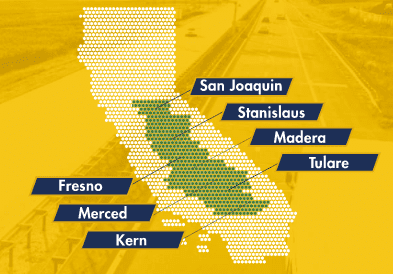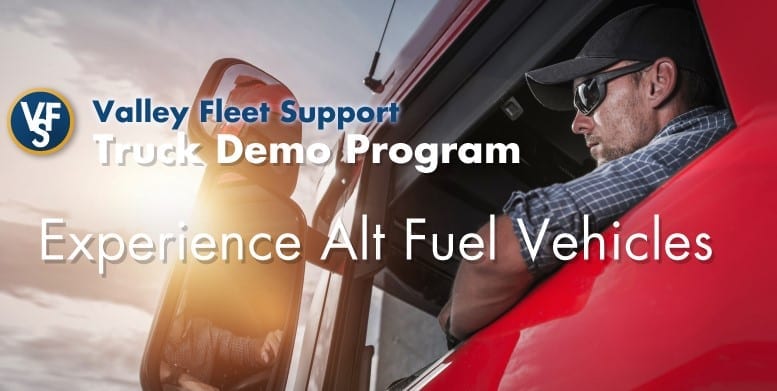Starting this October more than 30 different zero emission and alternative fuel medium- and heavy-duty trucks will be available for demonstrations in the California Central Valley. The program is set to be the largest truck demo program of its kind in California, and will include natural gas, propane autogas, and battery-electric vehicles. Box trucks, tractors, cargo vans, cutaway vans, and more will be available for demonstration by fleets. Station developers are also participating and providing fleet operators the chance to learn about existing or planned fueling infrastructure in their area.

The program fills a need that has been developing over the Spring and Summer months. COVID-19 cancelled or postponed almost every trade and equipment show this year, so there have not been opportunities for fleets to experience new trucks on a trade show floor or at a ride and drive event. In-person experiences provided through this truck demo program are one of the few ways for fleets to check out new trucks and technologies—which may not be available to see on dealer lots.
Kicking the Tires
Getting behind the wheel of advanced technology trucks quickly answers questions about performance and operations.
Manufacturers and upfitters participating in the program include ADOMANI, Lightning Systems, Motiv, OrangeEV, ROUSH CleanTech, and SEA-Electric. Several fleet operators who already operate alternative fuel vehicles are making their own trucks available as well. Fleets participating in the program will have a vehicle brought directly to their facility so they can kick the tires in person. In select cases, and subject to availability, some trucks may be loaned for several days for demonstration trials.
According to Karen El Mann, SVP of Programs at GNA, “Getting behind the wheel of advanced technology trucks quickly answers so many questions about performance and operations. The significant interest from Central Valley fleets about different technologies and funding is a clear indication that demonstrations in real operations is the next step. Fleets are pushing hard now to replace vehicles voluntarily because once it’s mandated, grant funding will not be available to support it.”
Given the number of vehicles available for the truck demo program, demand for the program is expected to be high. The Central Valley is host to an enormous amount of goods movement and agricultural operations. Combined with its unique geography, these activities create a substantial air pollution burden for Central Valley residents.
More than 30 different zero emission and alternative fuel trucks will be available for truck demos in central California.
Why the Central Valley Focus?
The Central Valley has significant air quality issues—which make the region ideal for investments in clean transportation technologies that offer big benefits from a public health perspective. The California Energy Commission has funded Valley Fleet Support (VFS), to facilitate the truck demo project. Gladstein, Neandross & Associates, a clean transportation consulting firm, is organizing this initiative in partnership with major truck manufacturers, up-fitters, and station operators.
Because this project is publicly funded, there is no cost for fleets or technology providers to participate. Interested fleets can simply sign up by visiting the VFS website and indicating what types of trucks they are interested in. VFS staff will coordinate with technology providers to bring a truck to the fleet’s own facility to demo. In some cases the truck will be loaned to the operator for several days in order to evaluate the vehicle in day to day operations.
Grants and Incentives
As in other parts of California, grant funding for replacement trucks offers fleets a significant cost reduction benefit. Central Valley fleets are eligible for up to $200,000 per battery-electric truck and $100,000 per natural gas truck. One of the most successful and popular sources of funding is the San Joaquin Valley Air Pollution Control District’s Truck Replacement Program. Another important funding source for new truck purchases is HVIP funding. There are other programs for off-road yard tractors, infrastructure, and farm equipment.
This truck demo project is publicly funded, with no cost for fleets or technology providers to participate in the program.
Fleets that participate in the truck demo program will also receive no-cost consulting support from Valley Fleet Support staff to determine funding options. Constraints such as deployment timing and planned routes can make some grant programs more appealing to fleets than others. Additionally, Valley Fleet Support staff are advising fleets on the Air District’s new electric yard tractor program and the upcoming second round of the clean vehicle fueling infrastructure program.
Central Valley Region Gaining Momentum
In the last 10 years, the HVIP program alone (not counting Air District or other state initiatives) has funded more than $31,284,900 in new alternative fuel or zero emission truck projects in the Central Valley. This has led to the deployment of over 531 alternative fuel trucks and 27 alternative fuel stations.
Fleets that participate in the truck demo program will recieve support from Valley Fleet Support.
Many of these fleet projects are concentrated in food production or food processing, due to the leading role agriculture has in the region. Recent examples include zero emission and near zero emission deployments by Frito-Lay in Modesto, Bolthouse Farms in Bakersfield, and Western Milling in Visalia.
Each of these fleets has in common a commitment to do things at scale—and quickly. In Modesto, Frito-Lay is transitioning their entire operation to alternative fuels as a part of a $30.8 million initiative. The Frito-Lay initiative includes 15 heavy-duty battery-electric tractors, 6 battery-electric box trucks, 3 battery-electric yard tractors, and 12 E-Forklifts. In Kern County, Bolthouse Farms has recently transitioned a third of their yard tractors over to zero emission technology. And in Visalia, Western Milling is utilizing 27 CNG trucks with plans to increase that number further, as well as to open a public CNG station. Across the valley the new technologies are gaining the support of leadership, and fleet operators as well.
According to Western Milling President Tony Correia, “Many of today’s fleet owners and Class 8 truck operators are uncertain about the new near-zero emission technology. Initially we were, however after careful consideration, and some aggressive research, Western Milling found that our new CNG trucks in many ways perform much better than their diesel counterparts. In addition, the benefits to the environment and the communities in which we serve are exponential and will leave a cleaner environment for generations to come.“
Despite COVID19, Central Valley fleets are continuing to announce new alternative fuel truck projects and explore new technology options. The trend towards diesel displacement and the adoption of clean transportation technologies shows no sign of slowing.



